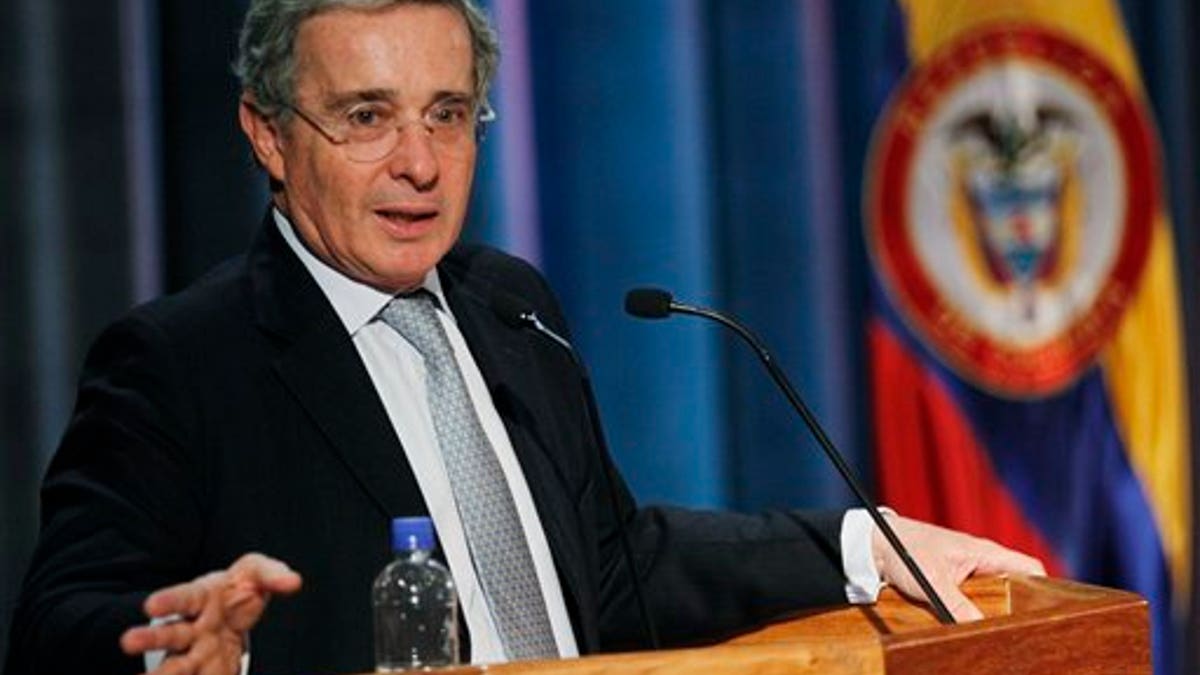
Alvaro Uribe at the Nueva Granada military university in Bogota, Colombia, on August 26, 2011. (AP)
Alvaro Uribe is not quite done with the political spotlight, not if he can help it.
Uribe has become the first former Colombian president in modern times to attempt a return to politics through Congress.
The combative conservative who led Colombia from 2002 to 2010 announced Monday he is running for Senate in March elections, two months before a presidential vote.
Uribe is constitutionally barred from a third presidential term.
He will run as part of a movement he created called Centro Democratico atop a closed list of candidates, meaning his chances hinge on how many votes his party wins.
Uribe's approval rating stands at 63 percent, more than 40 points higher than that of President Juan Manuel Santos.
Uribe is a fierce critic of Santos' efforts to make peace with Colombia's main leftist rebel group. Santos has not yet said whether he'll seek re-election.
Uribe is esteemed for putting the FARC, Colombia's main rebel group, on the defensive during his 2002-2010 tenure and for overseeing the bold rescue from rebel clutches of Ingrid Betancourt, a former presidential candidate held hostage for 6 1/2 years, and three American military contractors.
He is known as the man who professionalized Colombia's military and ended the country's notoriety as the world's kidnap capital.
At the same time, he is accused of having abetted a dirty war against the FARC's alleged sympathizers, in which hundreds of bodies of noncombatants piled up.
At 59, Uribe justifies his activism by claiming he is needed to save his Andean nation from backsliding into chaos.
However, his strategy may be backfiring and inviting his own legal peril. It is encouraging his enemies to gather evidence against him in hopes of putting him behind bars.
Two years ago, Jorge Noguera, his hand-picked chief of the DAS domestic security agency, was sentenced to 25 years in prison for collusion with paramilitaries and murder. Prosecutors said he provided "hit lists" of leftist activists and was directly responsible for the killing of a prominent sociologist who was aiding the forcibly displaced. When Noguera left the agency in 2005, Uribe extolled him as a "buen muchacho" — a good guy.
Uribe himself was questioned by a Congress commission for alleged offenses including illegal spying by the DAS after Noguera's departure.
Uribe accuses his foes of waging a campaign of "criminal vengeance." His defenders say the critics are simply tools of the FARC. To The Associated Press, he shrugged off the attacks, saying: "It's all right. That's democracy."
Uribe, 61, lives with one of his two sons in a Bogota house on a police compound. His wife, Lina Moreno, lives mostly on a family ranch near Medellín, 150 miles away.
He spends a lot of time doing what ex-presidents do here just as they do in the U.S: He lectures for fees, gave some seminars at Georgetown University in Washington, D.C. and in 2011 had the role of elder statesman co-chairing a U.N. commission that investigated Gaza-related violence.
Based on reporting by The Associated Press.
Follow us on twitter.com/foxnewslatino
Like us at facebook.com/foxnewslatino





















